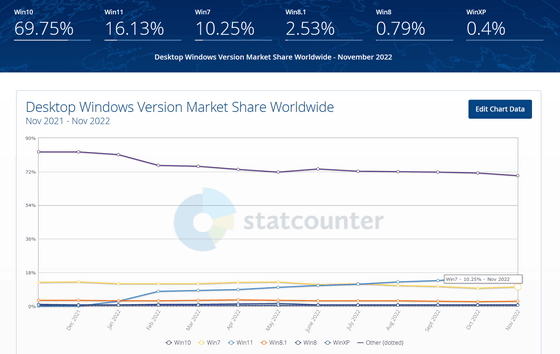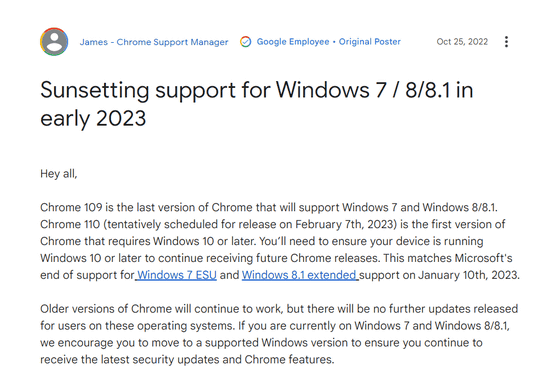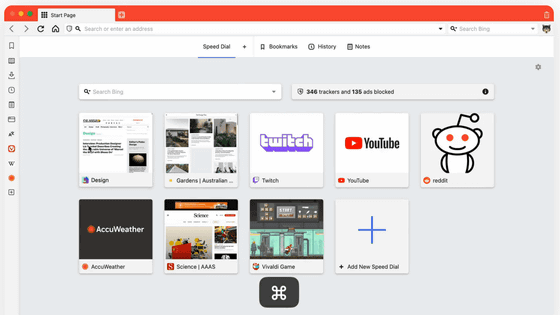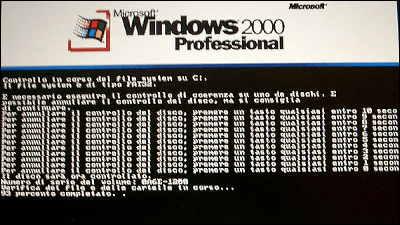Developer explains why web browser 'Vivaldi' ends support for Windows 7 and Windows 8.1

Web browser
Pulling the plug on expired Operating Systems | Vivaldi Browser
https://vivaldi.com/blog/pulling-the-plug-on-expired-operating-systems/
All browsers run on top of operating systems named Android, iOS, Linux, macOS, ChromeOS and Windows. These OSs provide many features to the applications running on them, such as file systems, keyboard, mouse and graphics support. The OS manages the hardware-specific drivers for these functions so that applications don't have to implement everything from scratch.

by
Each OS is regularly updated to fix bugs, add new features, support new hardware, etc. However, maintaining an old version of the OS becomes more difficult as time passes. Older versions will need to be tested on hardware and configurations that are not available or difficult to obtain, and the availability of development staff familiar with older systems and hardware is also important.
EOL (End-Of-Life), which indicates how long an OS version will be supported, is decided long before the actual end of support. At EOL, the version will stop being updated and users will have to move to a new version or new hardware or live with the risk of their computer being attacked.
And different OS versions cause problems for browsers as well. The superior functionality that the OS maintains for applications is accessed through various functionality calls called SDKs or APIs . This means that special code must be written to support older OSes, and all variations must be tested on relevant hardware. However, it is often not possible to have an older hardware environment that can be tested, and supporting older versions complicates the logic of the code, making it difficult to maintain and test, and can introduce hard-to-find bugs. produce sex.
So when an OS version hits EOL, browser development teams have to consider whether and for how long they should support that older version. At that time, the number of users of the old platform and the difficulty of continuing support will be used as criteria for judgment.
Especially when support tools such as compilers and SDK packages that need to be updated regularly to support new OSes no longer support older versions, maintenance becomes difficult. In that case, the question arises as to whether to support the old version of the OS or the new version, and the correct answer is to give priority to supporting the new version and discard the old version.
Microsoft support for Windows 7 ended on January 14, 2020 . Although the end of support date was announced long ago, a survey immediately after the end date reported that 53% of corporate users were using Windows 7. Also, according to the research company Statcounter, as of November 2022, 10.25% of Windows users are using Windows 7.

For the above reasons, the Chromium team has indicated that it will continue to support Windows 7, but has decided to end support for Windows 7 and Windows 8.1 in early 2023.
Sunsetting support for Windows 7/8/8.1 in early 2023 - Google Chrome Community
https://support.google.com/chrome/thread/185534985/sunsetting-support-for-windows-7-8-8-1-in-early-2023

Since Vivaldi is based on Chromium, support for Windows 7 and Windows 8.1 will end when Chromium 110 becomes the base in the next version of Vivaldi 5.6. Once we no longer support these OS versions, the development team will start removing obsolete code, making it virtually impossible to run Windows executables on these OS versions.

If you're on a computer with an OS that's 5-6 years old or older, it's time to consider updating to a more recent OS, even if your browser and other applications still work. 'It's only a matter of time before an OS is no longer supported,' Patterson said. Having an environment means providing the best functionality and security.'
Related Posts:







